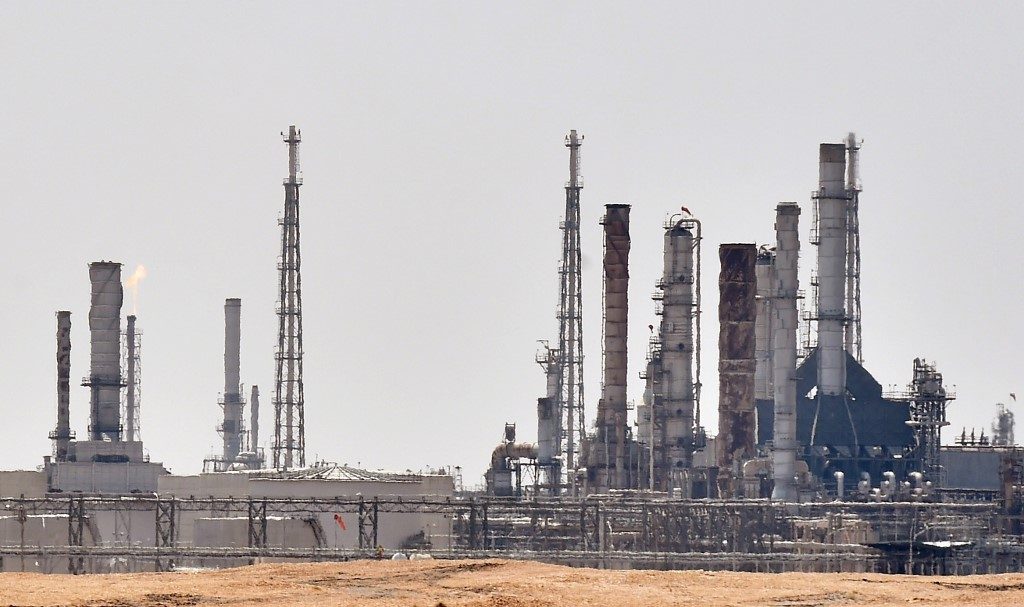SUMMARY
This is AI generated summarization, which may have errors. For context, always refer to the full article.

JEDDAH, Saudi Arabia – Saudi Arabia said Tuesday, September 17, its oil output will return to normal by the end of September, seeking to soothe rattled energy markets after attacks on two instillations that slashed its production by half.
The weekend strikes on Abqaiq – the world’s largest oil processing facility – and the Khurais oil field in eastern Saudi Arabia roiled energy markets and revived fears of a conflict in the tinderbox Gulf region.
Energy Minister Prince Abdulaziz bin Salman, who was only appointed to the role earlier this month, said that the world’s top energy exporter had dipped into its strategic reserves to maintain supply to clients.
“I have good news for you…the oil output to international markets is back to what it was before the attack,” he told reporters in the western Red Sea city of Jeddah.
“During the past two days the damage was contained and 50% of the production has been recovered,” he added. “Production will be back to normal by the end of September.”
Prince Abdulaziz said the kingdom would achieve 11 million barrels per day (bpd) capacity by the end of September and 12 million bpd by the end of November.
“Restoring sustainable production capacity to 11 million bpd by the end of the month is an ambitious target, given the amount of repairs required” at the sites, Alex Schindelar, president of the Energy Intelligence group, told Agence France-Presse (AFP).
The extent of the damage at the plants remains unclear and Energy Intelligence has said that some of the repair work could take “several weeks.”
‘Aramco delivers’
But Saudi officials were also bullish on plans for the mega stock listing of oil giant Aramco, which was thought to be imperiled by the attack.
“The IPO (initial public offering) will continue as is, we won’t stop anything,” said Aramco chairman Yasir al-Rumayyan.
He said the IPO would take place “within the next 12 months” depending on market conditions.
The energy giant’s CEO, Amin Nasser, dismissed the suggestion it had taken a big reputational hit with the strikes, which observers have said exposed the vulnerabilities of Saudi infrastructure.
“We are the most reliable company. When there is a crisis Aramco delivers,” he told reporters.
“Actually the rest of the world should be amazed at what happened. In terms of no customers were interrupted, and production was put back on in a short time.”
The mammoth IPO forms the cornerstone of a reform program envisaged by de facto ruler Crown Prince Mohammed bin Salman to wean the Saudi economy off its reliance on oil. (READ: Saudi’s young heir apparent, between reforms and crackdown)
Saudi Arabia’s energy infrastructure has been hit before, but the attack on Saturday, September 14, was of a different scale, abruptly halting half the OPEC kingpin’s output – some 6% of the world’s oil supply.
As the US points the finger of blame at Saudi Arabia’s regional rival Iran, Prince Abdulaziz – half-brother to Prince Mohammed – refused to be drawn on who was responsible for the strikes.
“We don’t know who is behind the attack,” he said, adding that the kingdom wants “proof based on professionalism and internationally recognized standards.”
Washington has concluded that the attacks were launched from Iranian soil and that cruise missiles were involved, a US official told AFP on Tuesday.
The official, who declined to be identified, said the United States was gathering evidence about the attack to present to the international community, notably European allies, at the UN General Assembly next week. – Rappler.com
Add a comment
How does this make you feel?
There are no comments yet. Add your comment to start the conversation.